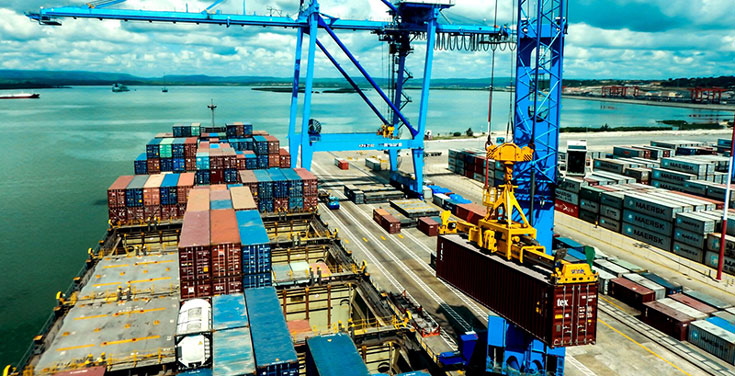The regional logistics community has welcomed the joint action by the Kenya Ports Authority (KPA) and the Kenya Revenue Authority (KRA) to decongest the Port of Mombasa and speed up cargo clearance. The move is expected to boost trade efficiency and ease pressure on East Africa’s busiest seaport.
In a statement issued by the Federation of East African Freight Forwarders Associations (FEAFFA), President Charles Mwebembezi praised the two agencies for responding to concerns raised by traders and freight forwarders about delays and high logistics costs.
“We welcome this timely intervention by KPA and KRA. The Port of Mombasa is a vital artery for regional trade. Improving its efficiency benefits importers, exporters, freight forwarders and consumers across East Africa,” said Mr. Mwebembezi.
Mr. Mwebembezi noted that recent disruptions in neighbouring transit routes had diverted some cargo from Dar es Salaam to Mombasa. The demonstrations in Tanzania after the elections slowed operations at the Port of Dar. This sudden shift increased cargo volumes at Mombasa. He said the situation highlights the need for stronger port management and closer coordination among agencies.
He also noted that as the year ends, cargo volumes are rising. Better coordination among port stakeholders is essential to keep goods moving and reduce turnaround time. Efficient port operations, he said, will also help freight forwarders deliver faster, lower costs for traders, and stabilise consumer prices.
The joint KPA–KRA agreement sets out coordinated measures to decongest the port, reduce dwell time, and improve customs clearance. Stakeholders from KEBS, KEPHIS, KIFWA, KSAA, SCEA, KTA, CFSA, and the CMA were also present. Their participation signalled a renewed government and private sector effort to streamline port operations and strengthen trade facilitation along the Northern Corridor.
According to the communiqué released after the signing, the new measures take effect immediately. All long-stay containers will be moved to licensed Container Freight Stations (CFSs) or Inland Container Depots (ICDs) to free up space and improve cargo flow. Cargo destined for Mombasa will be cleared at designated CFSs, while cargo for Nairobi and other upcountry destinations will be transported by rail to the Nairobi ICD. Transit cargo for Uganda, Rwanda, South Sudan, and the DRC will be moved to the Naivasha ICD for clearance.
To support the evacuation of long-stay cargo, KPA and KRA will waive 100% of accrued storage and warehouse rent for importers who apply within 30 days. Shipping lines have also been encouraged to waive detention and demurrage charges to complement the effort.
Other measures outlined in the communiqué aim to enhance efficiency and streamline port operations.
All cargo cleared under the Single Customs Territory (SCT) regime will be exempted from RECTS e-seal arming, except for consignments flagged through risk assessment.
To improve logistics and truck turnaround time, KRA and KPA will adopt risk-based scanning procedures, allowing containers bound for CFSs to be moved immediately after scanning. Image analysis will be completed later to avoid unnecessary delays.
Kenya Railways will provide a detailed shunting schedule to ease traffic flow, while the Port Police, KPA, and KR will jointly ensure that intersections remain clear at all times.
KRA will also geofence Gate 24 to facilitate the smooth exit of transit cargo, complementing existing operations at Gates 18 and 20.
The communiqué further emphasizes the need for round-the-clock port operations, harmonising working hours across all agencies to achieve seamless 24/7 processing.
Cargo not cleared within the five-day free storage period will be transferred to nearby CFSs, with importers allowed to nominate their preferred station.
In addition, KRA will roll out a new Pre-Arrival Processing (PAP) system, allowing documentation and clearance to be completed before cargo arrives at the port. Long-term efficiency gains will also be achieved through digital alignment across all port systems.
FEAFFA applauded this collaborative approach, noting that such measures reflect a deep understanding of the challenges faced by the logistics industry. The federation said the initiative is not just a Kenyan effort but a regional relief that will ease the movement of goods across borders.
FEAFFA members in Uganda, Rwanda, Burundi, South Sudan, and the DRC all depend on the Port of Mombasa. Every hour saved here has ripple effects across the region. The federation added that continued modernisation of customs and port procedures will make the Port of Mombasa more competitive and strengthen Kenya’s position as the leading maritime and logistics hub in East and Central Africa.
The writer is the Communications and Advocacy Officer at the Federation of East African Freight Forwarders Associations (EAFFA) and can be reached at oniongaam@gmail.com





